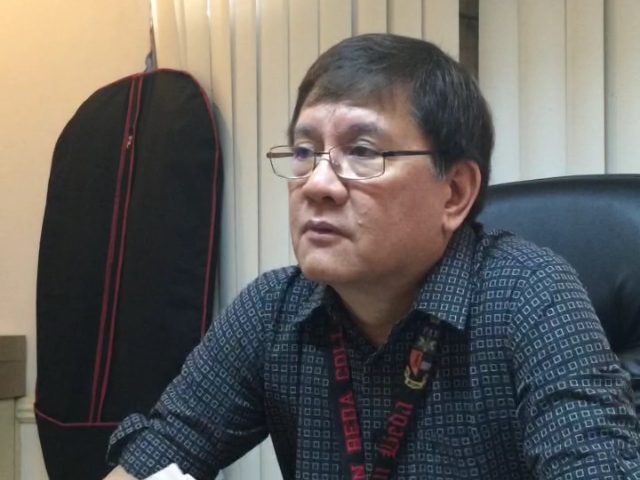SUMMARY
This is AI generated summarization, which may have errors. For context, always refer to the full article.

Discussion on the Marcos burial in the video above starts at the 12:00 timecode.
MANILA, Philippines – The Supreme Court (SC) is taking up the issue of the burial of former president Ferdinand Marcos at the Libingan ng mga Bayani. The topic continues to be a divisive one, with supporters and critics passionately exchanging arguments. (READ: Highlights: 1st day of SC orals on Marcos burial)
Father Ranhilio Aquino, dean of the San Beda Graduate School of Law, told Rappler on Saturday, September 3, he favors a Marcos burial at the Libingan ng mga Bayani because there is “no single, canonical way of reading and interpreting history.”
Discussing the academic aspects of the case, Aquino said that all objections to the burial are “largely a matter of evaluating history.” (READ: The hermeneutics of bayani)
He argued that the protests revolve around the idea that Martial Law is oppressive, so the “author” of Martial Law should not be buried there. For Aquino, that’s “making too many assumptions.”
“That’s always the problem if you try to evaluate something in the past on the basis of evidence you have in the present. There will be different interpretations, and I don’t want one group canonizing, making determinative its reading of history.”
Aquino also emphasized that Martial Law was declared “not under the present constitution but under the 1935 Constitution that granted him (Marcos) Martial Law powers in only one sentence, and did not tell him how far he went.”
“It was not like he declared on a whim. He had legal basis. We may not agree with him now, but agreements, disagreements of an academic kind like that are certainly no reason not to allow him to be buried” at the Libingan, Aquino said.
Victims of human rights, yes
Aquino acknowledged there were victims of human rights violations during Martial Law whom we should sympathize with, and their experiences should not be brushed aside. (READ: Women victims tell SC of Martial Law torture)
“But to say that Marcos is responsible for all of that? That’s quite a leap,” he argued.
“Even under the general provisions of international criminal law, where you use such doctrines as command responsibility, there are requisites to be fulfilled before you can point an accusing finger at Marcos,” Aquino added.
There should be evidence or proof directly linking Marcos to every single incident of abuse, he continued.
If critics were to blame Marcos for that, he said, “then every single person extrajudicially killed after Marcos should also be considered a victim of the president sitting at that time.”
“The fact [remains] that a lady or man stands before the Supreme Court and says, ‘I was victimized by colonel so-and-so, or a general so-and-so.’ But does that immediately allow us to conclude, therefore, Marcos is liable for this? There’s such a long way to go before you can make that statement.”
As for the 1993 deal that provided conditions on the return of Marcos’ remains to the Philippines, he argued that Duterte is not bound by that agreement. “Can a former president put limits on the acts of a future president? I don’t think that’s possible,” he argued.
Aquino also offered a different take on the 1986 People Power Revolution that ousted Marcos from the presidency.
For one, he questioned the size of the crowd that gathered on EDSA, asking, “How many percent of the Filipino population did EDSA in fact represent, so that you can say that their acts…represented a decision of the entire nation to get rid of him?”
He also pointed out, “Did [Marcos] leave Malacañang? Yes, he did. But was he ousted? That’s quite a different matter. Did the Armed Forces as a whole withdraw its support for the president? Not so. Up to the end, some loyalist generals stood by him.”
Duterte’s popularity
Aquino also observed a similarity in the popularity of Marcos and current President Rodrigo Duterte.
Why is Duterte “overwhelmingly popular” despite reports of a rising death toll in the fight against illegal drugs and criminality? Aquino argued, “It’s because we people who keep shouting about human rights and keep whining about violations of rights somehow have a ‘national infatuation’ with strongmen.”
“Shortly after Martial Law was declared [by Marcos], people did welcome it, as a respite from the almost ceaseless demonstrations, mass actions that all but paralyzed Manila at the time,” Aquino continued.
But he conceded that it is scary to lose rights and freedoms in the middle of the government’s response against lawlessness. “The moment you step on that, you step on a very slippery slope.”
Finally, Aquino said that people are willing to give Duterte a chance, as evidenced by his high trust ratings.
But he hopes that the President should realize that “he really cannot promise prosperity on the basis of short-cuts in legal procedure.”– Rappler.com
Add a comment
How does this make you feel?
There are no comments yet. Add your comment to start the conversation.